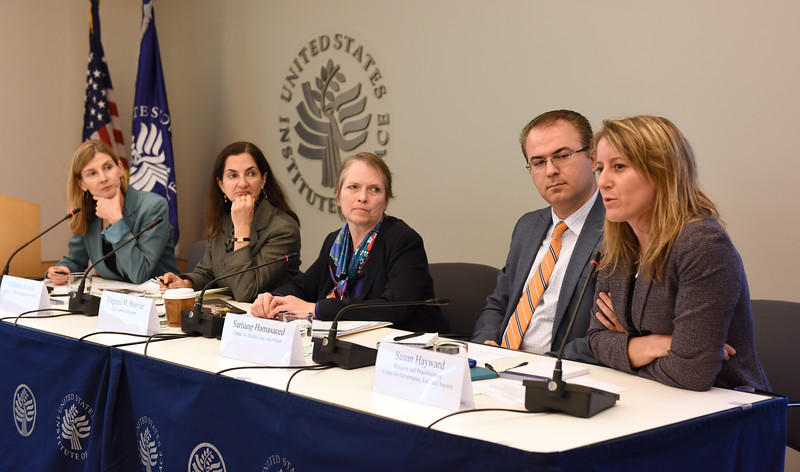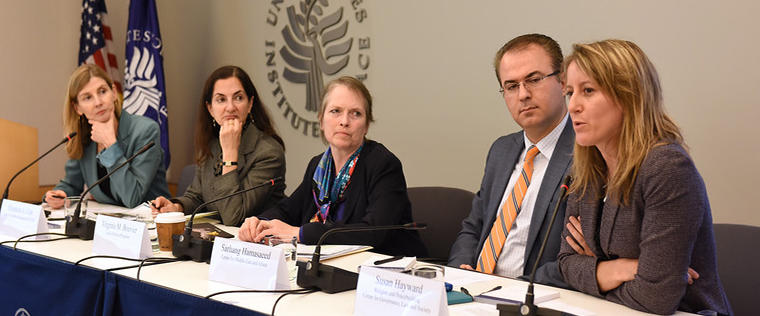The World’s Cultures See Disparate Paths to Pulling Up the Roots of Conflict
Apology. Confession. Truth-telling. Forgiveness. These are elements of reconciliation, perhaps the most important underpinning for turning a violent conflict into durable peace. Yet building peace is complicated by a reality that human cultures have no agreed definition of reconciliation. Indeed many may resist it as an imposed Western value, USIP scholars said.

Speaking at a forum on the United Nations-declared International Day of Peace, the four scholars drew on their experience as researchers and facilitators to explore obstacles and opportunities for reconciliation in conflict-wracked areas including Iraq, Colombia, Sri Lanka and Northern Ireland.
“Forgiveness is letting go of all hope of a better past,” USIP President Nancy Lindborg recalled a mentor saying.
The importance of reconciliation to peacebuilding, said USIP President Nancy Lindborg, is captured in an aphorism she learned from a mentor: “Forgiveness is letting go of all hope of a better past.”
The first step toward reconciliation is understanding that the concept is viewed through cultural prisms, said Elizabeth Cole, of USIP’s research unit.
“In many parts of the world it’s considered a very loaded term and very Western and Christian,” Cole said.
How can that be overcome?
A Sri Lankan Exercise
Susan Hayward, a USIP director for religion and peacebuilding, recalled an exercise in Sri Lanka with a peacebuilding group that the Institute began supporting before the government defeated the Tamil rebels in 2009. Many of the Sri Lankans resisted the term because it they felt it reflected a Judeo-Christian perspective on what’s necessary to reconcile people with each other.
In each corner of the room where the multi-ethnic, multi-religious group met, signs were placed bearing a particular value related to peacebuilding and religion. Participants were asked to assemble under the one that addressed their top concern. Muslims quickly gathered under “justice and accountability”; Buddhists under “truth”; Hindus beneath “mercy and compassion”; and Christians below “forgiveness.”
“That led to a productive discussion that these elements can’t be separated,” Haywood said. “Each is important and they must be woven together by the community.”
Iraq: No Consensus
In Iraq, there’s no common understanding of the meaning of reconciliation, said Sarhang Hamasaeed, a senior Iraq expert. The country’s multi-layered conflicts are rooted in its Sunni-Shiite divide, in region-wide ethnic tensions among Arabs, Kurds and Persians; and in sectarian tensions fueled by regional powers.
“Most people today talking about reconciliation are thinking of a national, political one, which has not come into place,” he said.
ISIS’s seizure of communities in Iraq has complicated matters as some residents sided with the extremist group and others with the government, while many just left, Hamasaeed said. Another complexity is that a long, shifting conflict has shuffled some communities between roles, as both victims and oppressors. Shiites abused under Saddam Hussein’s Sunni-dominated regime are seeking justice, while perpetrators of crimes under that government may now themselves be victims of ISIS, a Sunni organization, or of Shiite militias.
Even so, Hamasaeed said Iraqi facilitators trained by USIP have had some success in reducing inter-communal violence. He pointed in particular to inter-tribal talks held in the wake of ISIS’s June 2014 massacre of 1,700 mostly Shiite Iraqi air force cadets and soldiers at a base known as Camp Speicher. Some politicians and Shiite leaders accused local Sunni tribes of having helped with the slaughter—an allegation the Sunnis firmly denied.
“The potential for tribal revenge was huge,” Hamasaeed said. “We tapped into tribal relationships from the Sunni side and the Shia side.” The key to heading off a cycle of violence was the Sunnis’ agreement to support judicial proceedings against any member of their tribes who were found to have helped in the killings, Hamasaeed said.
In Latin America
Western and mostly Christian Latin America, especially its Southern Cone, has also been resistant to reconciliation, said Virginia Bouvier, the Institute’s senior advisor for Latin America. While many people demand punitive justice against those involved in atrocities by the continent’s dictatorships, they often view the mechanisms of reconciliation as “compromise and avoidance,” she said.
“Argentines will say it’s ‘turn-the-page and nobody’s judged’ and no accountability; how can they reconcile if the truth’s not been told and there’s no justice?” she said.
On the South American continent, Colombians are making the most headway toward reconciliation, said Bouvier, who has led USIP’s years-long work to support Colombia’s peace process.
Speaking just days before Colombia’s government and rebel movement announced a breakthrough in peace talks, Bouvier noted that they had agreed to key principles that lay a foundation for reconciliation. The agreements announced September 23, “officially place restorative justice and the reparation of harm done to victims at the center of a new special judicial process for peace in Colombia,” Bouvier said this week. Disagreement persists over who is a victim, the nature of the conflict, when it started and who’s at fault.
While national politics can form an important framework for reconciliation, studies have shown it’s critical that reconciliation efforts aren’t imposed from the top and instead rely on what local people say they need, Cole said. And in Colombia, even amid the war, that’s begun, according to Bouvier. Religious groups such as the Ecumenical Group of Women Peacebuilders have started holding discussions between former adversaries while 3,000 people affected by the conflict participated in organized forums around the country set up to hear each others’ perspectives.
Forgiveness “can never be forced,” Bouvier said. “There are many kinds of justice. The U.S. looks to retribution. Colombians, after so many years of war, are beginning to look to restoration.”
Reconciliation for Next Generations
The scholars agreed that the ultimate goal of reconciliation is long-term and multi-generational. With a commitment by the state, education can play a role in defusing hostile narratives, Cole said. In Northern Ireland textbooks that take up the Catholic-Protestant conflict were written by integrated teams and were widely “thought to be rather fair,” she said. In Colombia, by contrast, 12 academics produced 14 reports on the nature of the conflict for the peace talks; there were no areas of agreement from which to create a final report, Bouvier said.
The world’s attention usually shifts after a political peace process ends an active conflict, Cole noted. But that resolution may involve only a war-exhausted first generation, leaving the hostile narratives to live on. As research has shown, “Grievances don’t just dissipate with time,” she said.
Fred Strasser is a freelance writer and editor for the U.S. Institute of Peace.
